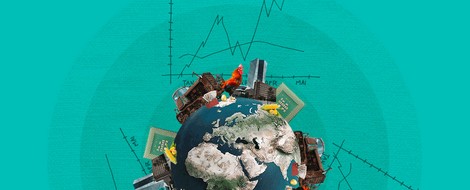Your podcast discovery platform
Curious minds select the most fascinating podcasts from around the world. Discover hand-piqd audio recommendations on your favorite topics.

piqer for: Boom and bust Health and Sanity Global finds Doing Good
Danielle Batist is an experienced freelance journalist, founder of Journopreneur and co-founder of the Constructive Journalism Project. She lived and worked all around the globe and covered global and local stories of poverty, exclusion and injustice. Increasingly, she moved beyond ‘problem-reporting’ to include stories about the solutions she found. She witnessed the birth of the new nation of South Sudan and interviewed the Dalai Lama. She reported for Al Jazeera, BBC and the Guardian and regularly advises independent media organisations on innovation and sustainability. She loves bringing stories to the world and finding the appropriate platforms to do so. The transformation of traditional media fascinates rather than scares her. While both the medium and the message are changing, she believes the need for good storytelling remains.
If Robots Take Our Jobs, Should They Pay Our Taxes Too? The Case Against
As my fellow piqer Georg Wallwitz highlighted in a recent piq: it’s about time we start to seriously think about the feasibility of a robot tax.
Following reading his piqd Quartz interview with Bill Gates, I came across this interesting perspective from famous former finance minister of Greece Yanis Varoufakis. He presents three arguments against Gates’ suggestion of a tax on robots who "take our jobs".
It’s complex stuff for the non-economist, and I was pleased to see that Varoufakis made his case really clear by taking an example of a farmer (Kuke), who replaces a worker (Ken) with a robot (Nexus) to operate his harvester longer, more safely and without lunch breaks or sick pay.
He raises some very interesting ethical questions to show the complexity of regulating and taxing such a new, but inevitably growing field:
“It is hard philosophically to justify forcing Luke to pay “income” tax for Nexus but not for the harvester that Nexus operates. After all, both are machines, and the harvester has displaced far more human labor than Nexus has. The only defensible justification for treating them differently is that Nexus has greater autonomy.”
Unlike Gates, Varoufakis’ conclusion is that we should forget about taxing robots and find other ways to compensate for inevitable job losses on the horizon. Instead, he says, we should “place a portion of Luke’s equity in the farm in a public trust, which then provides a universal payment to everyone”.
With articles like these, that feel so futuristic yet could be reality sooner than we think, I always wonder how we’ll look back on them in a couple of years. In the meantime, it certainly is good to see that the debate is starting to shape up.
